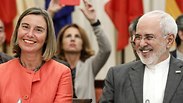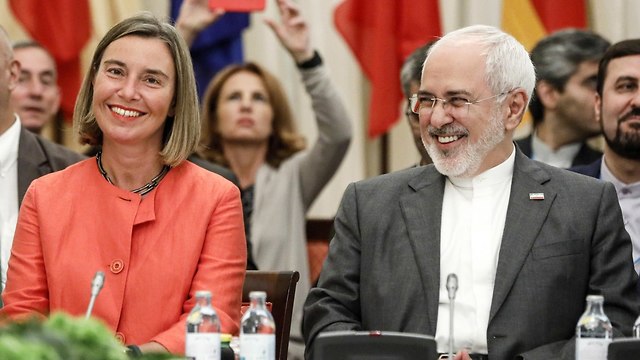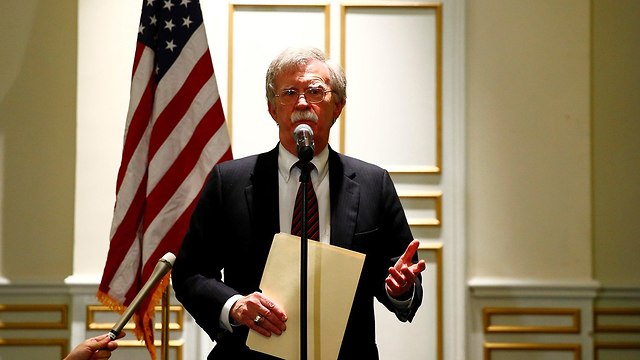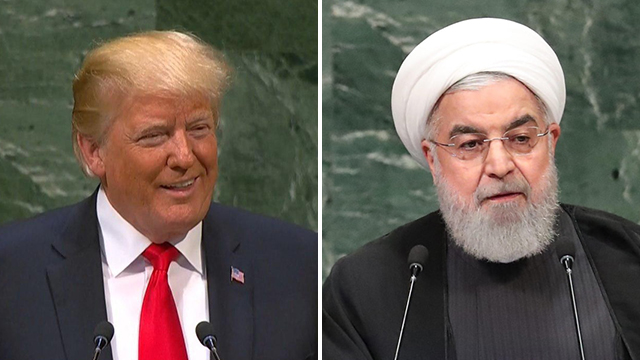
Mogherini and Zarif
Photo: MCT
Iran on Saturday set a deadline for November 4 by which it expects the European Union to implement a mechanism to enable continued trade with the Islamic Republic despite the re-imposition of American sanctions in the aftermath of President Donald Trump’s pullout from the 2015 nuclear deal.
The EU announced on Tuesday that it would set up a legal body to allow continued trade with Iran, bypassing the US sanctions.
Iranian Deputy Foreign Minister Abbas Araghchi made the announcement in an interview with the official IRNA news agency. "The Europeans know our position that until then, at least part of the mechanism should come into effect, albeit partially," he explained.
November 4 is the date that a second round of US sanctions, aimed at the export of Iranian oil, among other things, are to come into effect.
In announcing the establishment of the sanctions-bypassing entity, EU foreign minister Federica Mogherini said it would provide economic aid to Tehran, which is suffering a financial and political crisis following US sanctions.
In a statement, Mogherini said that "the body will facilitate legitimate economic transactions with Tehran, in order to enable continued trade with it."
At the end of a meeting with senior officials from Britain, China, France, Germany, Russia and Iran, she added that it is important to "develop channels of payment with Iran."
Trump's National Security Advisor John Bolton said in response that "the United States will not allow Europe to evade sanctions on Iranian oil and finance it indirectly." He added that the sanctions will be “aggressive and unambiguous” and that the “US will not allow the EU or anyone else to undermine them.”
Bolton also sent a threatening message to Iran: "If you do not change your behavior, you will experience hell. The US will pursue you."
The remarks were made following the harsh words by US Secretary of State Mike Pompeo against the EU — due to the initiative. At a press conference in New York, Pompeo said that the European move was not only unhelpful, but would accomplish the opposite. “I was deeply disappointed to hear that those who remained in the nuclear agreement with Iran are announcing that they are setting up a special payment mechanism to bypass American sanctions," he said.
The foreign minister of the United Arab Emirates also attacked the European Union. In an interview with Reuters on the sidelines of the UN General Assembly, Minister Anwar Gargash said that "the Iranians are counting on European policy and trying to drive a wedge between the powers in the European Union and the United States."
Gargash added that "European policy gives Iran a glimmer of hope regarding trade, but in the end they will also get in line with US policy toward Tehran."
Since the renewal of sanctions, a number of companies have announced that they will cease their activities in Iran. The Iranian leadership has complained to the European Union that its leaders are not doing enough to maintain the nuclear agreement with it.
Earlier this week, Swedish automaker Volvo announced that it would stop producing trucks in Iran due to US sanctions. "With all these sanctions and with everything the United States is doing, the banking system simply does not work in Iran. We cannot get paid," said company spokesman Frederic Iverson.
At the same time, France's government owned investment bank Bpifrance announced the suspension of a program initiated earlier this year to help French companies trade with Iran despite US sanctions. According to the plan, the bank was supposed to finance companies that wanted to export goods to Iran. "The conditions are not fitting, the sanctions are hurting companies," the CEO said.
Ali Samhani, head of the National Security Council of Iran, accused US President Donald Trump of using sanctions as "personal revenge" against other countries. He also noted that Iran should start a constructive dialogue in order to avoid tensions with its neighbors.
Last week it was reported that the US administration had succeeded in persuading the German carmaker Volkswagen to cease most of its operations in Iran as part of the sanctions.
According to US ambassador to Germany Richard Grenell, who conducted the talks with the German company, according to the agreements reached between the parties, the company will be allowed to continue transactions that have been excluded for "humanitarian reasons." "Volkswagen has informed us that it will cooperate with the US sanctions on Iran," Grenell told Bloomberg.
After pulling out from the nuclear agreement, Trump warned many countries that they should choose whether to continue doing business with the world's largest economy or to cooperate with Iran. Representatives from the US State Department prepared the ground for further sanctions on Iran — aimed primarily at the energy industry and chemical plants in the country.
A senior State Department official said that European countries and businessmen are much closer to the US position on the issue than to the European Union’s.
Reuters recently reported that the US is trying to initiate negotiations with Iran regarding its nuclear program and its regional behavior.
US special envoy to Iran Brian Hawke said the United States is interested in forging a treaty, not just an agreement between two governments. According to him, the Iranian leaders are not interested in negotiations despite President Trump's desire to meet with Iranian President Hassan Rouhani.



















